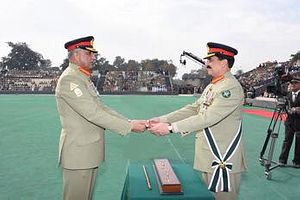Since its independence, Pakistan has spent more than two-thirds of its time under military rule. After three successful coups in 1958, 1977, and 1999, the Pakistani military continues to exercise great influence over matters of state even as civilians lead the country today. This is doubly true in matters affecting Pakistan’s internal and external security and foreign affairs.
Last week, we witnessed a remarkably overt spark in civil-military tensions in the country in what was really the continuation of an episode that kicked off in October 2016. Back then, Cyril Almeida, a journalist with the respected English-language Pakistani newspaper Dawn, published an article that detailed an uncomfortably frank warning from Pakistan’s civilian leaders, including Prime Minister Nawaz Sharif, to the country’s military establishment in a closed door session over the latter’s tolerance and support for non-state actors against India and Afghanistan. Entitled “Act against militants or face international isolation, civilians tell military,” the article shamefully led to Almeida’s temporary addition to the country’s Exit Control List (ECL) as the government convened an investigation after denying the veracity of the claims.
These tensions simmered for months, with several important developments taking place in the meantime — not least of which was the commotion-free transfer of the Pakistani military’s leadership from Gen. Raheel Sharif to Gen. Qamar Javed Bajwa. Then, in the final week of April, the civil-military intrigue reached a new high. On April 29, Sharif’s office issued a notification on the government’s investigation into the so-called Dawn leaks (i.e., the matter of who sourced Almeida). In it, among other actions, Sharif underlined that Tariq Fatemi, a longtime confidant to the prime minister, would take the fall over the episode. The document said that the “allocation of portfolio of foreign affairs to Syed Tariq Fatemi, special assistant to the prime minister, shall be withdrawn.”
The same day, Maj. Gen. Asif Ghafoor, the head of Pakistan’s Inter-Serves Public Relations, the military’s communications arm, swatted down the notification from the prime minister’s office. In a tweet, he said that the “Notification on Dawn Leak is incomplete and not in line with recommendations by the Inquiry Board,” referring to the committee convened in October 2016 to look into the matter. The military as an institution, thus, publicly rebuked the prime minister by effectively signaling that further action would be necessary to win over its approval. As far as the military is concerned, Fatemi’s sacking amounts to a wholly inadequate reaction from the government.
The significance of the above chronology of events remains hotly debated among the Pakistani political commentariat and among external watchers of Pakistan alike. The central question seems to be how far the military will look to push back against Sharif from here, with a range of outcomes under consideration, ranging from no further escalation to an all-out coup. Bear in mind that Sharif himself was previously ousted in a coup by his then-Chief of Army Staff Gen. Pervez Musharraf in 1999. After more than a decade in exile, he remains aware that any civilian prime minister of Pakistan will have to equally navigate friction with the military and the political opposition. Still, since Musharraf’s departure, civil-military tiffs in Pakistan have mostly played out behind the scenes, leaving this highly publicized “rejection” of the prime minister’s notice effectively unprecedented.
Most importantly, this latest bout of civil-military tensions in Pakistan shows the remarkable endurance of the Pakistani military’s institutional culture, dealing a blow to analysis that had suggested that Bajwa, as Nawaz Sharif’s uncontested recommendation for COAS, would soften the military’s influence over Islamabad given his own proclivities as a sober, pro-democracy type. (There’s little to suggest, beyond errant speculative conspiracy, that Raheel Sharif loyalists, for instance, worked to outflank Bajwa here.)
Instead, under Bajwa, we’ve seen an unusually bold moment of the military asserting its primacy in Pakistan’s post-Musharraf days. In fact, right after Ghafoor’s tweet, India alleged that two of its soldiers had been killed and mutilated by Pakistan Army soldiers, thereby increasing bilateral tensions between the two neighbors. Friction has been running high since the September 2016 Uri attack, which New Delhi blamed on Pakistan-based militants. India retaliated to that attack by claiming to have carried out a cross-border “surgical strike” on militant strongholds across the Line of Control (LoC), something Pakistan denied ever happened. (Other India-Pakistan tensions have festered beyond the LoC in the meantime, including the Kulbhushan Jadhav episode and the curious confession from a former Tehreek-e-Taliban Pakistan spokesperson.)
The coming weeks will be instructive of how Sharif and the military choose to proceed. The government may find itself surrounded on all fronts, however, as the political opposition sides with the military, sensing political opportunity to carve out space at the Pakistan Muslim League-Nawaz’s expense. Whatever lies ahead, the rest of the year will likely remain rocky in Pakistani civil-military relations and, if the ISPR’s decision to go public on Twitter is any suggestion, these tensions may play out more publicly than ever.

































